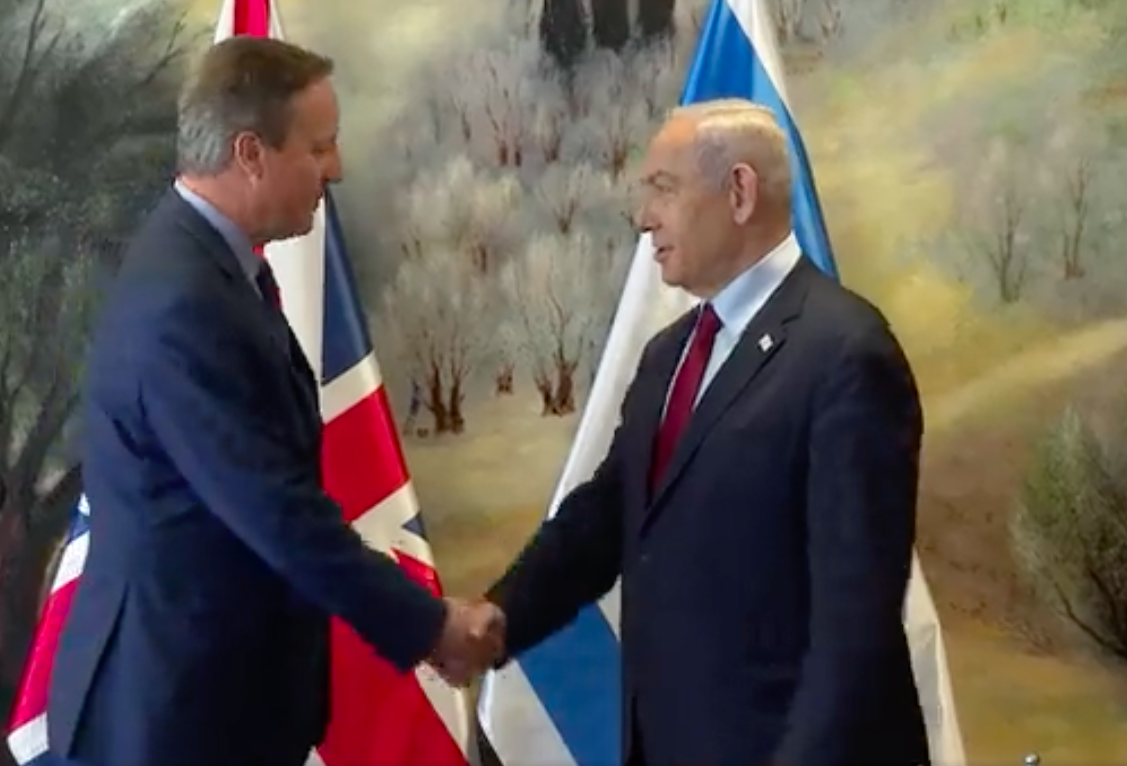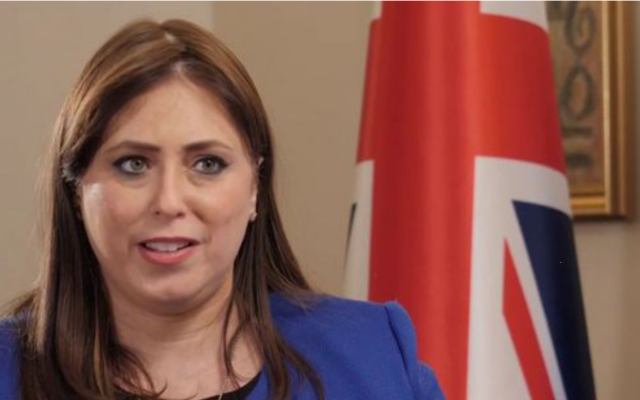Israeli ambassador’s rejection of two-state solution disappointing, says Cameron
Tzipi Hotovely told Sky News "absolutely no" when asked whether Palestinians would have their own state in any peace deal
Britain’s Foreign Secretary has described an interview in which the Israeli ambassador to the UK voiced opposition to a two-state solution in the Middle East as “disappointing”.
Lord David Cameron said he believes such an outcome remains possible but “very, very difficult” as he suggested the remarks should not have “too much weight” attached to them.
Israeli diplomat Tzipi Hotovely had said that her country “absolutely” would not accept a two-state solution when the war ends.
Appearing before the Lords European Affairs Committee on Thursday for the first lengthy episode of parliamentary scrutiny he has faced since returning to Government, the former prime minister said: “I think it is still possible but I think the pathway from where we are today to getting there is very, very difficult.”
He said the process would involve achieving a “sustainable” ceasefire, “ie Hamas not capable of doing what they did”, ensuring security and stability for Gaza and revitalising the Palestinian Authority.
Asked about what should be done following Ms Hotovely’s comments, the minister said: “I don’t know is the answer.

“I read the transcript and it is disappointing, but ultimately true security and stability for Israel, which is something I care deeply about – I believe in Israel as a homeland for Jewish people, I believe in its right to exist, to thrive, to defend itself and all the rest of it – long-term security I think requires there to be a state for Palestine as well.
“So I don’t think we should put too much weight on one interview. We have to get on and think about how to help make this happen.”
Rishi Sunak has stressed the UK remains committed to a two-state solution in the Middle East, which it considers the “right outcome” to the war.
He repeated his call for a “sustainable ceasefire” that involves Hamas no longer firing rockets at Israel and freeing hostages in exchange for more aid into the Gaza Strip.
Lord Cameron earlier announced travel sanctions on “extremist settlers” in the West Bank, who he accused of “undermining security and stability for both Israelis and Palestinians” by “targeting and killing Palestinian civilians”.
He tweeted: “Israel must take stronger action to stop settler violence and hold the perpetrators accountable.
“We are banning those responsible for settler violence from entering the UK to make sure our country cannot be a home for people who commit these intimidating acts.”
During a visit to a school in Finchley, north London, the Prime Minister was asked about Ms Hotovely saying the Oslo Accords, a peace process started in the 1990s and based on giving Palestinian people the right to self-determination, had “failed”.
Asked by Sky News in an interview published on Wednesday whether Palestinians would have their own state in any peace deal, Ms Hotovely replied: “The answer is absolutely no.
“Israel knows today, and the world should know now, the reason the Oslo accord failed is because the Palestinians never wanted to have a state next to Israel.
“They want to have a state from the river to the sea.”
The diplomat questioned why the West was “so obsessed with a formula that never worked, that created this radical people on the other side”.
Mr Sunak, asked about the remarks on Thursday, said: “We don’t agree with that.
“Our longstanding position remains that the two-state solution is the right outcome here.”
He added: “We will continue to support calls for a sustainable ceasefire where hostages are released, more aid can get in, and the rockets, crucially, stop being fired from Hamas into Israel as well.”
The United Nations’ General Assembly on Tuesday voted overwhelmingly to demand a ceasefire in Gaza, a move that was objected to by the US and abstained on by the UK.
Ms Hotovely said Israel needs “more than a few weeks” to “finish the job”, adding that Israeli cities had been barraged by 11,000 rockets in recent weeks.
She said a ceasefire now would be akin to welcoming “another attack” like that witnessed on October 7.
Hamas’s bloody raids on Israel more than two months ago saw 1,200 people killed and more than 240 taken hostage.
Israel’s air and ground assault launched in response has killed more than 18,600 Palestinians, according to the health ministry in Hamas-run Gaza.
Defence Secretary Grant Shapps recalled seeing a rocket launched from Gaza during a recent visit to Israel.
Speaking during a press conference in Tokyo, Japan, on Thursday, Mr Shapps said: “I was visiting one of the kibbutz where Hamas came in and slaughtered men, women and children; looking around the homes of where these people were killed and with some of the families (affected).
“And as I was standing there, a rocket was coming in from Gaza and an Iron Dome fired over the top of our heads, and 10 seconds later there is a big explosion.
“So Israel has a problem, which is what possible reassurances they have that Hamas won’t just continue to use the very considerable network of underground tunnels and command and control centres and the thousands of rockets that they have amassed, just to carry on doing the same thing again and break out again and and carry out murder.”
He added that Israel, in return, “needs to comply with international humanitarian law and needs to try to minimise the danger of civilians being caught up in” the conflict.
Meanwhile, the Foreign Office said a new Iranian sanctions regime, powers that were announced in July and came into force on Thursday, would target Tehran’s relationship with Hamas and fellow militants Palestinian Islamic Jihad.
The UK has accused Iran of funding anti-Israel groups across the Middle East, including Hamas in Gaza and Hezbollah in Lebanon.
The first set of UK designations under the sanctions regime includes Esmail Qaani, who Lord Cameron’s department said heads Iran’s Islamic Revolutionary Guard Corps (IRGC) Quds Force, which is believed to provide support to proxy groups.
Seven individuals in total have been hit with travel bans and asset freezes, with Mohammed Saeed Izadi, head of IRGC Quds Force’s Palestine branch, among them.
His branch is subject to the same restrictions, the Foreign Office said.

Thank you for helping to make Jewish News the leading source of news and opinion for the UK Jewish community. Today we're asking for your invaluable help to continue putting our community first in everything we do.
For as little as £5 a month you can help sustain the vital work we do in celebrating and standing up for Jewish life in Britain.
Jewish News holds our community together and keeps us connected. Like a synagogue, it’s where people turn to feel part of something bigger. It also proudly shows the rest of Britain the vibrancy and rich culture of modern Jewish life.
You can make a quick and easy one-off or monthly contribution of £5, £10, £20 or any other sum you’re comfortable with.
100% of your donation will help us continue celebrating our community, in all its dynamic diversity...
Engaging
Being a community platform means so much more than producing a newspaper and website. One of our proudest roles is media partnering with our invaluable charities to amplify the outstanding work they do to help us all.
Celebrating
There’s no shortage of oys in the world but Jewish News takes every opportunity to celebrate the joys too, through projects like Night of Heroes, 40 Under 40 and other compelling countdowns that make the community kvell with pride.
Pioneering
In the first collaboration between media outlets from different faiths, Jewish News worked with British Muslim TV and Church Times to produce a list of young activists leading the way on interfaith understanding.
Campaigning
Royal Mail issued a stamp honouring Holocaust hero Sir Nicholas Winton after a Jewish News campaign attracted more than 100,000 backers. Jewish Newsalso produces special editions of the paper highlighting pressing issues including mental health and Holocaust remembrance.
Easy access
In an age when news is readily accessible, Jewish News provides high-quality content free online and offline, removing any financial barriers to connecting people.
Voice of our community to wider society
The Jewish News team regularly appears on TV, radio and on the pages of the national press to comment on stories about the Jewish community. Easy access to the paper on the streets of London also means Jewish News provides an invaluable window into the community for the country at large.
We hope you agree all this is worth preserving.






















